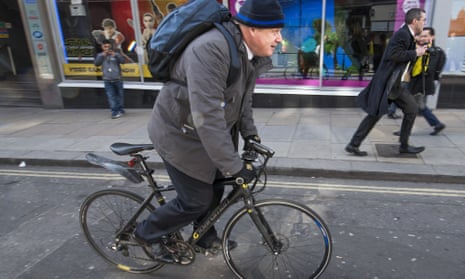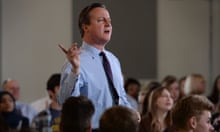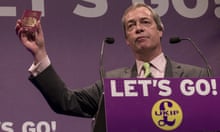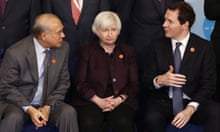The UK would face a decade of massive economic uncertainty with potentially disastrous consequences for business and the pound if it were to vote to leave the EU, the Europe minister says.
The dramatic warning from David Lidington, a key figure in David Cameron’s renegotiation of EU membership, is part of a frontal assault launched by Downing Street and the Foreign Office aimed at discrediting the campaign for Brexit, now headed by Boris Johnson and Michael Gove.
In an interview with the Observer, Lidington, who has served a record period of six years in his post and has more experience of EU negotiations than most in the cabinet, says the UK would be thrust into economic “limbo” for up to 10 years if the UK were to leave, as it tried to disengage from the EU on favourable terms and then establish a set of highly complex replacement trade deals across the world.
The intervention came as finance ministers of the G20 group of leading industrial nations meeting in China listed “a shock of a potential UK exit from the European Union” as one of the biggest risks to the world economy this year.
David Cameron said: “With so many gaps in the ‘out’ case, the decision is clearly one between the great unknown and a greater Britain.” Writing in the Sunday Telegraph, he said Brexit would create “huge amounts of uncertainty” and added: “It would be our children’s futures on the table if we were to roll the dice.”
Echoing a view shared by the prime minister and George Osborne, Lidington said that, according to the EU rulebook, the UK would be cut adrift from European treaties, and therefore the single market, two years after a vote to leave – before it would have had time to negotiate replacement trade deals.
“Trade deals between the EU and other countries and bilateral trade deals of any type normally take six, seven, eight years and counting,” Lidington said. “Everything we take for granted about access to the single market – trade taking place without customs checks or paperwork at national frontiers, the right of British citizens to go and live in Spain or France – those would all be up in the air. It is massive. It is massive what is at risk.
“You would be in complete limbo and I think what that would do for the pound and for business confidence would be very serious indeed. It could last a decade.”
Boris Johnson performed a sudden U-turn over Brexit, ruling out the possibility of a second referendum after a Leave vote – something he, Gove and other Outers, including former Tory leader Michael Howard, have recently suggested would be possible.
Johnson told the Times he wanted the UK to “get out and then negotiate a series of trade arrangements around the world” and that “out is out”.
As part of a coordinated assault, foreign secretary Philip Hammond accused the Leave camp of confusion and of having no clear idea of what would follow a vote to get out of Europe. He told the Observer: “The Leave campaign has come up with 20 possible options, but they all contain significant risk to the British economy. Leave campaigners now have to answer these key questions: what does leaving look like? How many years would it take to put in place a new deal with the EU? And what will happen to our security cooperation arrangements with the EU?
“Until we have their answers, a vote to leave is a leap into the dark that would put the security of Britain’s future at risk.”
A document published on 28 Februaryby the Britain Stronger in Europe campaign says Brexit campaigners have floated 30 different models of independent statehood from Peru to Iceland, suggested as worthy of replication. The document highlights differences among Out camp leaders over whether the UK would end freedom of movement or continue to make a contribution to the EU budget.
It claims that Matthew Elliott, the chief executive of the campaign group Vote Leave, has said that the UK “would still retain its membership” of the single market but also that “the benefits of the single market are far outweighed by the costs”.
In response, Elliott said: “If we vote to remain, we will keep giving away power and money every year. If we vote to leave, we will take back control and spend our money on our priorities.
“We will be able to kick out those who make our laws. We will be able to have a fairer, more humane and more sensible immigration policy. We will have a new UK-EU partnership based on free trade and friendly cooperation. We will regain our independent voice on international bodies such as the World Trade Organisation, where we have given away our seat to Brussels. We will have more international influence to argue for greater international cooperation.”
In his Observer interview, Lidington said the Out campaign was peddling two contradictory arguments. “Their first belief is that inside the EU we cannot achieve any meaningful change and that too often the other countries are in some sort of nefarious conspiracy against our interests.
“But their second belief – which they hold equally firmly – is that outside the EU these very same countries and government would rush to give us some new deal that had all the benefits of EU membership … I think the Leave campaign is still in a state of confusion about what it actually means by leave.”
At the G20 finance ministers meeting US Treasury secretary Jack Lew expressed clear support for Britain’s continued membership of the EU. “Our view is that it’s in the national security and economic security [interests] of the United Kingdom, of Europe and of the United States for the United Kingdom to stay in the European Union.
“This is an issue that will be decided by the voters of the United Kingdom in June and we certainly hope that [they]reach that conclusion,” he added.
Ukip leader Nigel Farage said the G20 statements were “no surprise” and examples of “mates helping each other out”. “I’m not surprised that big government gets together to support David Cameron. This is big banks, big business, big government all scratching each other’s backs. I don’t think that impresses voters,” he said.








Comments (…)
Sign in or create your Guardian account to join the discussion